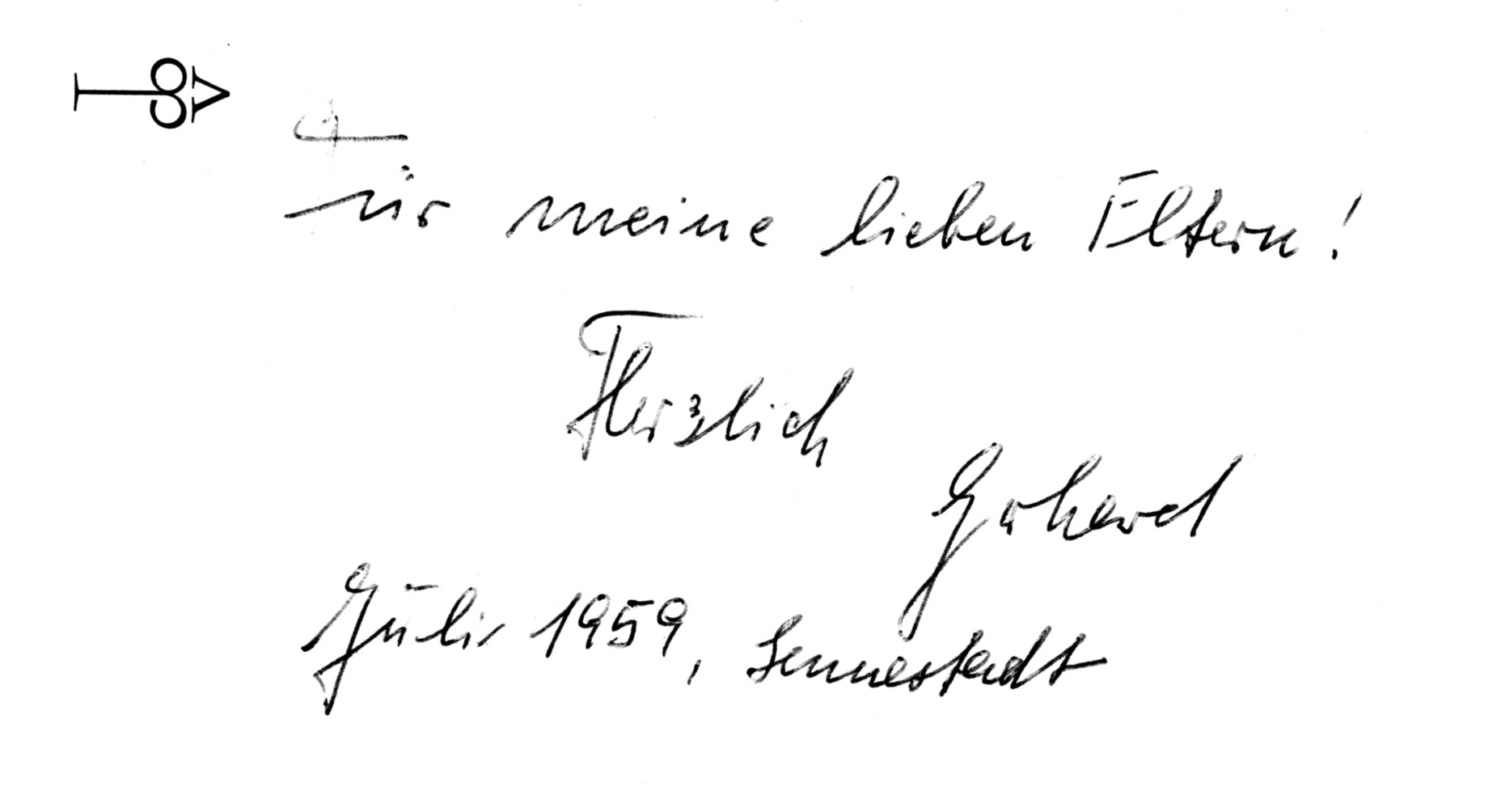
Edward Winter
At the Albert Einstein Archives website readers will find interesting documentary information by making a search for ‘Lasker’.
We are aware of one chess game attributed to Albert Einstein, a win against Oppenheimer (1 e4 e5 2 Nf3 Nc6 3 Bb5 a6 4 Ba4 b5 5 Bb3 Nf6 6 O-O Nxe4 7 Re1 d5 8 a4 b4 9 d3 Nc5 10 Nxe5 Ne7 11 Qf3 f6 12 Qh5+ g6 13 Nxg6 hxg6 14 Qxh8 Nxb3 15 cxb3 Qd6 16 Bh6 Kd7 17 Bxf8 Bb7 18 Qg7 Re8 19 Nd2 c5 20 Rad1 a5 21 Nc4 dxc4 22 dxc4 Qxd1 23 Rxd1+ Kc8 24 Bxe7 Resigns). When this game was first published seems impossible to say for certain, but it gained wide currency by appearing in a brief entry on Einstein in the Dictionnaire des échecs by François Le Lionnais and Ernst Maget (Paris, 1967). The source specified was Freude am Schach by Gerhard Henschel (Gütersloh, 1959), although the French reference book used the conditional tense, to convey uncertainty about the game’s authenticity (‘la partie suivante qui aurait été gagnée par Einstein contre le grand physicien Robert Oppenheimer’).
Neither of the above-mentioned books offered a date or a venue, and the note of caution added by the Dictionnaire was subsequently neglected. Contradictory specifics appeared in other books; for example, page 415 of Şah Cartea de Aur by Constantin Ştefaniu (Bucharest, 1982) described it as a ‘game of historic value’ played in the United States in 1940. Elsewhere the date has been given as 1933, and the venue as Princeton.
The Dictionnaire also had an entry for Stalin, with the following illustrative win over ‘le chef de la Guépéou’: 1 e4 c5 2 Nf3 d6 3 d4 cxd4 4 Nxd4 Nf6 5 Nc3 Nbd7 6 Be2 a6 7 O-O e6 8 f4 b5 9 a3 Bb7 10 Bf3 Qb6 11 Be3 Qc7 12 Qe2 Be7 13 g4 Nc5 14 Qg2 O-O 15 Rad1 Rfe8 16 g5 Nfd7 17 Rd2 e5 18 Nf5 Ne6 19 Nxe7+ Rxe7 20 f5 Nd4 21 f6 Ree8 22 Bh5 g6 23 Bxg6 hxg6 24 Qh3 Ne6 25 Qh6 Qd8 26 Rf3 Nxf6 27 gxf6 Rc8 28 Rdf2 Qxf6 29 Rxf6 Rc7 30 Nd5 Bxd5 31 exd5 Nf8 32 Bg5 Nh7 33 Rxd6 e4 34 Be3 Rce7 35 Bd4 f6 36 Bxf6 Nxf6 37 Rdxf6 Resigns. Again the source mentioned was Henschel’s book Freude am Schach, and the French authors made the same use of the conditional tense to indicate their doubts: ‘la partie suivante qui aurait été gagnée par Staline’.
Le Lionnais and Maget put the heading ‘Staline-Yejov, Moscou?, 1926?’. Although the year 1926 has now stuck to the game, it seems to be based on a misreading of Henschel’s book (pages 86-90). True enough, ‘1926’ is the only date to appear on those pages, but its context had nothing to do with when the game allegedly took place. Indeed, Henschel’s own claim was that it was much older, for the first sentence of his item affirmed that Stalin had played it ‘kurz nach seiner Flucht aus der sibirischen Verbannung’ (page 86), whereas two pages later Henschel’s (1959) book stated, ‘Wenn wir bedenken, dass die Partie schon vor rund 50 Jahren gespielt wurde ...’
As regards the genesis of the game, he said (page 86) that it had been written down from memory by an unnamed associate of Lenin:
‘Die hier aufgezeichnete Partie ist uns nur durch einen Zufall bekannt geworden. Ein alter Mitarbeiter Lenins, dessen Name leider nicht bekannt ist, hat sie aus der Erinnerung aufgeschrieben.’
Was Henschel’s dire book, which is replete with errors of all kinds (Fischer is misspelt ‘Fisher’ throughout), really the first appearance in print of the Einstein and Stalin games? What credibility does either have?
Finally for now, we mention that our copy of Freude am Schach contains an inscription by Henschel to his parents:

(3533)
Gerhard Henschel’s 1959 book Freude am Schach was discussed in C.N. 3533 in the context of two highly dubious games claimed by him to have been played by Einstein and Stalin. On pages 93-94 of the same book Henschel gave a game purportedly won by Leo Tolstoy (1828-1910) from a royal opponent (‘gegen den Fürsten Ivkoff’)
(3667)
For further details see Leo Tolstoy and Chess.
A. Soltis gave the alleged Einstein game on page 372 of the July 1979 Chess Life & Review, with the following introductory note:
‘I’ve tried to find a good game by top-flight scientists without success. The following, which can boast of two of the greatest names in physics, will have to do. It was apparently played in the late 1940s when Hans Albert Einstein, son of the Einstein, and Robert Oppenheimer were both on the faculty of the University of California at Berkeley. Hans Albert was, by the way, an internationally known hydraulic engineer – an expert on control of rivers.’
As usual, Soltis offered nothing whatsoever to back up his assertions about the circumstances in which the game was ‘apparently’ played.
(3691)
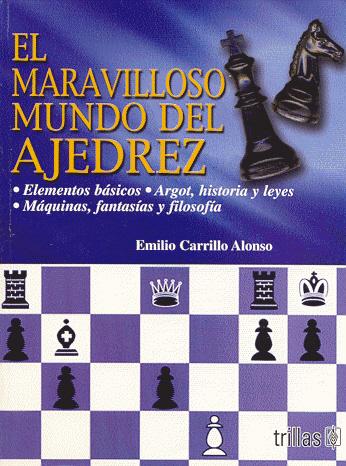
Owing to a printing fault in our copy of El maravilloso mundo del ajedrez by Emilio Carrillo Alonso (Mexico City, 2002) quite a few pages are blank. It is a pity that those which are not are not. Pages 157-160, for instance, might profitably have been an ink-free zone, but instead the author annotates games purportedly played by Stalin and Einstein, both of them headed ‘Moscow, 1926’.
(4133)
C.N.s 3533, 3667, 3691 and 4133 have touched on a game labelled Einstein v Oppenheimer. No evidence has been found that Albert Einstein had anything to do with it.
Over a century ago a player named B. Einstein was occasionally mentioned in chess literature. From page 273 of the September 1910 Deutsche Schachzeitung:
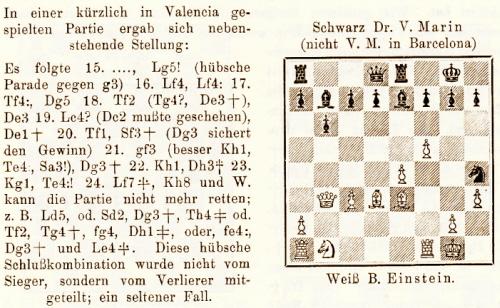
The reference in the caption ‘nicht V.M. in Barcelona’ indicated that Black was Dr V. Marín of Valencia, and not Valentín Marín y Llovet of Barcelona.
The game below was published on pages 13-14 of the January 1911 Deutsche Schachzeitung. Neither player had sight of the board.
B. Einstein – W. Ahrens
Valencia, October 1910
Giuoco Piano
1 e4 e5 2 Nf3 Nc6 3 Bc4 Bc5 4 O-O d6 5 h3 Nf6 6 c3 O-O 7 d4 exd4 8 cxd4 Bb6 9 Nc3 Kh8 10 a3 Nh5 11 Ng5 g6 12 Nxf7+ Rxf7 13 Bxf7 Qf6 14 Bb3 Bd7 15 e5 dxe5 16 dxe5 Nxe5 17 Nd5 Qc6 18 Re1 Rf8 19 Nxb6 Qxb6 20 Rxe5 Qxf2+ 21 Kh1 Ng3+ 22 Kh2 Nf1+
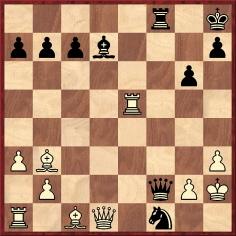
23 Qxf1 Qxf1 24 Bd2 Qxa1 25 Bc3 Rf6
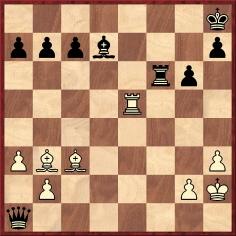
26 Re1 Resigns.
(8525)
Olimpiu G. Urcan (Singapore) sends us the following from page L 17 of the New York Times, 28 March 1936:

Concerning Einstein and Emanuel Lasker:
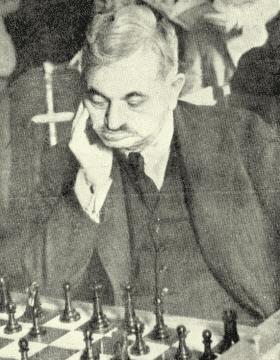
Emanuel Lasker
Emanuel Lasker Biographie eines Schachweltmeisters by J. Hannak (Berlin-Frohnau, 1952) featured a Preface (Geleitwort) by Albert Einstein signed ‘Princeton, NJ, Oktober 1952’. (For Einstein’s handwritten version, see the link provided in C.N. 3533.) Heinrich Fraenkel’s English version of the Hannak book was published in London in 1959 under the title Emanuel Lasker The Life of a Chess Master.
This chronology seems straightforward, but the reality is more complex. Firstly, a Vorwort by Herbert Engelhardt to the German edition (omitted from the English book) noted that Hannak’s volume was originally intended for publication in 1938, to mark Lasker’s 70th birthday. The possibility at one stage of an English translation by Reuben Fine was also mentioned.
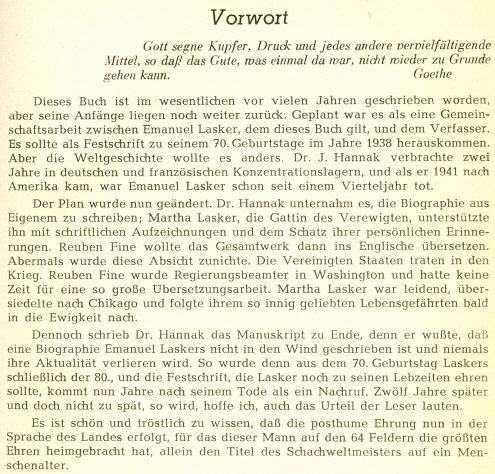
Another complication arises from the following paragraph on page 171 of CHESS, August 1944:
‘New Book on Lasker. Dr Albert Einstein has written a fine introduction to Dr Hannak’s biography of Emanuel Lasker, which Barnie F. Winkelman has translated from the German. The English edition will be published as soon as the paper shortage abates.’
Although 15 years passed before the English book appeared, Einstein’s text was published in English on page 130 of the May 1955 Chess Review. In a footnote Winkelman stated:
‘In 1942, Dr John J. [sic] Hannak had completed his biography of Dr Emanuel Lasker and sent the manuscript to me – in German – with a view to an edition in English. I translated his work into English and, in view of the references to Dr Einstein, suggested that the latter might write an introduction. I wrote to Dr Einstein and received a most courteous reply in which he referred to his old friend and asked for a few days to prepare a fitting foreword to the book. With characteristic care and caution, he also asked for the biography. This I sent to him. Within a week, I received the foreword – in German. I have translated it adequately, I hope. I believe Dr Hannak has embodied this in his biography which was duly published in Vienna [sic] ...’
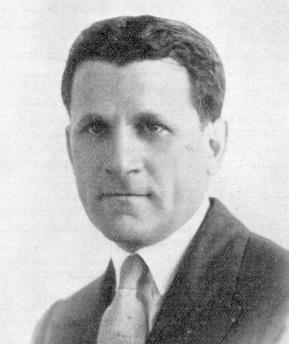
Barnie Frank Winkelman
Winkelman’s translation of the Einstein text differs, of course, from the Fraenkel version in Emanuel Lasker The Life of a Chess Master. On pages 315-316 of that book Fraenkel explained his own involvement by referring to his ‘impatience for an Anglo-American edition of Dr Hannak’s book’; the fact that Winkelman had already undertaken a translation was not mentioned. We recall no reference to Winkelman in Hannak’s book and do not know what became of Winkelman’s complete translation. And why is Einstein’s Geleitwort dated 1952 rather than 1942? Was it a mere case of re-dating to make the text appear more current?
(4995)
Addition on 23 March 2025:
From the ‘Capitol Stuff’ column by John O’Donnell (1896-61) on page 4 of the New York Daily News, 27 June 1951:

‘“Remember Truman and his intimates are poker players. Stalin, Malik and the Kremlin crowd are all chess players. A good chess player can always beat a good poker player. As a matter of fact, this country hasn’t got a good chess player in public life, with the possible exception of New York’s Tom Dewey.”’
We make no comment on the significance or otherwise of these
observations.
To the Chess Notes main page.
To the Archives for other feature articles.
Copyright Edward Winter. All rights reserved.